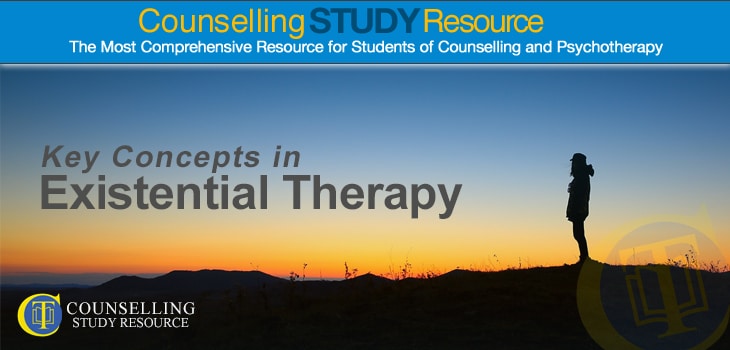Existential therapy takes a philosophical/intellectual approach to therapy. It sees humans as:
- having the capacity for self-awareness, experiencing tension between freedom and responsibility
- creating an identity and establishing meaningful relationships
- searching for the meaning, purpose and values of life
- accepting anxiety as a condition of living
- being aware of death and non-being
Having the capacity for self-awareness means that we as humans can reflect and make choices. We can expand our awareness through realising that:
- we are finite: time is limited
- we have the potential and the choice to act or not to act
- meaning is not automatic – we must seek it
- we are subject to loneliness, meaninglessness, emptiness, guilt and isolation
Accepting Freedom and Responsibility
Existential therapy posits that we are free to choose among alternatives, and thus we are responsible for our lives, actions and any failure to take action. If clients blame others for their problems, therapists in this modality would help them recognise how they allowed others to decide for them and the price they pay for doing so, and would encourage them to consider the alternative options.
Identity is the courage to be: we must trust ourselves to search within and find our own answers. Our great fear is that we will discover that there is no core or self. Clients who are struggling with their identity need to be challenged, asking them in what ways they have lost touch with their identity and are letting others design their life.
Relationship to Others
Existential therapy suggests that we are alone. We as humans must therefore give a sense of meaning to life, decide how we will live, have a relationship with ourselves and learn to listen to ourselves. Humans need to create close relationships with others. Therapists might challenge clients on what they get from their relationships, and how and why they avoid close relationships.
Search for Meaning
Existential therapists encourage clients to ask themselves what they want from life, and where the source of meaning lies for them in life. A trusting therapist–client relationship is important in teaching clients to trust their own capacity to find their way of being. Finding meaning in life is a by-product of engagement, which is a commitment to creating, loving, working and building. Meanwhile, meaninglessness in life leads to emptiness and hollowness (sometimes known as an ‘existential vacuum’).
Anxiety in Existential Therapy

Anxiety is seen by existential therapists as being a condition of living, naturally arising from a person’s striving to survive. This is known as ‘existential anxiety’ and is a normal outcome of facing the four ultimate concerns in life: death, freedom, isolation and meaninglessness.
Once existential anxiety is recognised, it can be dealt with constructively. Anxiety can be a stimulus for growth as we become aware of and accept our freedom. If we have the courage to face ourselves and the challenges of human life, we may be frightened but we can change.
Free Handout Download
Key Concepts of Existential Therapy
Awareness of Death
Death is seen as providing the motivation for us to live our lives fully and take advantage of each opportunity to do something meaningful.
How Existential Therapy Works
This modality aims to help clients to expand self-awareness, increase potential choices, accept responsibility for their choices, and experience authentic existence. The therapist seeks to understand the client’s subjective world, encourage the client to accept personal responsibility, and get them to take responsibility for their role in any problematic life situations.
Existential therapy is not technique-oriented; instead, the interventions used are based on philosophical views about the nature of human existence, and use the therapist’s self. It is particularly well-suited to clients who are bereaved, facing significant decisions or developmental crises, coping with failures in marriage and work, or dealing with physical limitations due to age.
Strengths and Weaknesses for Multicultural Working
Existential therapy is applicable to diverse clients who are searching for meaning in their lives, including examining whether their behaviour is being influenced by social and cultural factors. Therapists can help clients to weigh up the alternatives and possible consequences, to recognise how they contribute to their situation, and to identify how they can change their external environment.
However, critics of existential therapy see it as excessively individualistic; for many cultures, it is not possible to talk about self and self-determination outside the context of the social network. This modality can also be seen as ignoring the social factors that cause human problems: even if clients change internally, there may be little hope that the external realities of racism or discrimination will change.
Existential therapy can also be difficult for clients who expect a structured and problem-oriented approach instead of discussion of philosophical questions.
